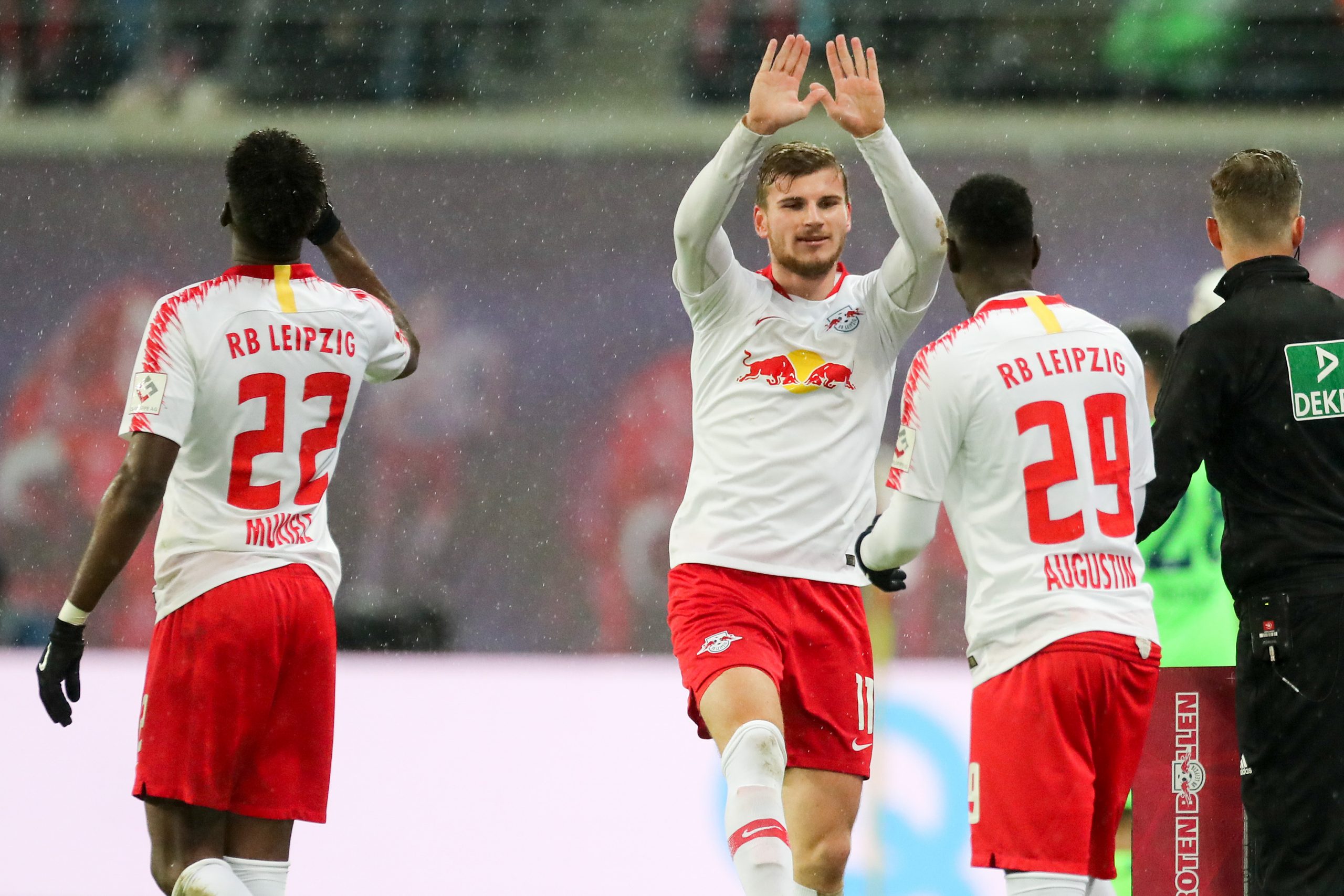A team in transition is usually bad. The term is a polite way of saying that sure maybe they used to be good, and maybe they’re going to be good again in the future, but right now, this team, it stinks. RB Leipzig was supposed to be a team in transition. They lost a star player in Naby Keita. Previous manager Ralph Hasenhüttl left after last season’s disappointing sixth place finish and his permanent replacement 31 year old wunderkind Julian Nagelsmann is finishing out his contract at Hoffenheim this season before taking over at the beginning of next year. It all has transition year written all over it. There’s one problem though. RB Leipzig appear to be good. The team decided to keep the interim coaching job in house for the season. Ralf Rangnick, who has in some role or other been a major architect of the Red Bull soccer empire since 2012, took up the managerial reins, his second stint helming Leipzig. He also managed them during the 2015-16 season, winning them promotion to the Bundesliga for the first time. Assisting Rangnick is Jesse Marsch, formerly the manager of the New York Red Bulls. It certainly seemed like ownership was deploying a couple of long-time employees to keep things ticking over for another year as they waited for the star manager to come in and turn things around. Leipzig currently sit in fifth place, but that undersells how well they’ve performed this season. Through nine games, the top of the Bundesliga is unexpectedly close. Bayern Munich’s struggles have opened the door for a host of teams to contend at the top. Leipzig is only five points behind first place Borussia Dortmund and three behind Bayern in second. Perhaps more importantly, their expected goals numbers are strong on both sides of the ball. The team's 1.70 xG per match is tied for second in the league and their 0.92 xG against is second as well. That puts their xG difference at 0.78, third best in Germany. In a Bundesliga that is frequently imbalanced with teams either excelling at attacking or defending, but not both, Rangnick and Marsch have achieved balance. Leipzig has succeeded this season by working hard at getting good old meat and potatoes shot advantages over their opponents. They are a relatively average side when it comes to the quality of the shots they take and the shots they concede. Their xG per shot is 0.11, sixth in the league and their xG per shot against of 0.10, is 11th. But their shot differentials are fantastic. They take the third most shots per game with 15.88 and concede 9.38 the second fewest. The attack is balanced. Emil Forsberg is the first among equals when it comes to creativity, both in ball progression and setting up teammates, with Kevin Kampl and Marcel Sabitzer as willing, if slightly junior accomplices. 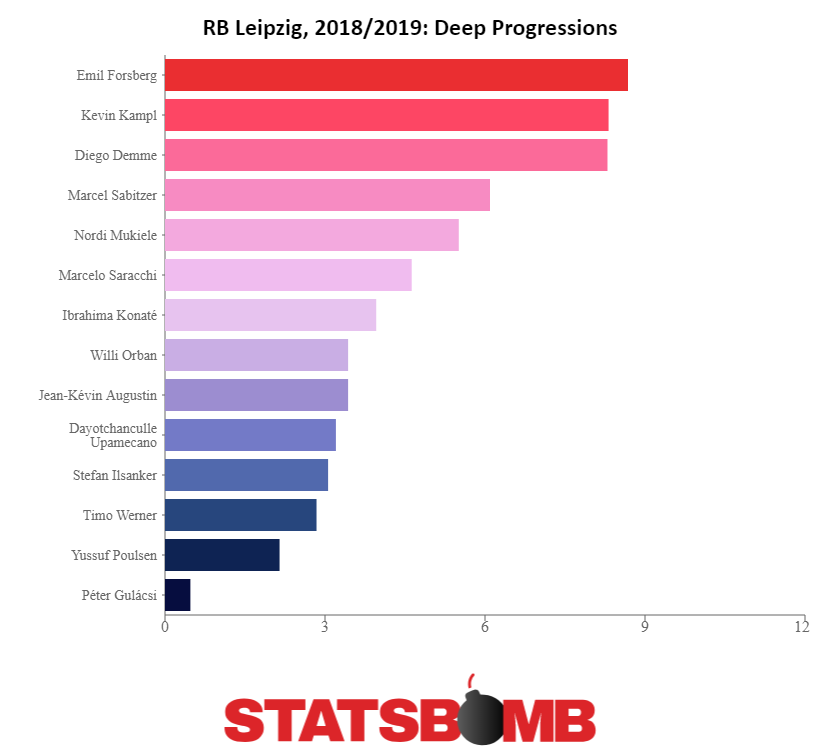
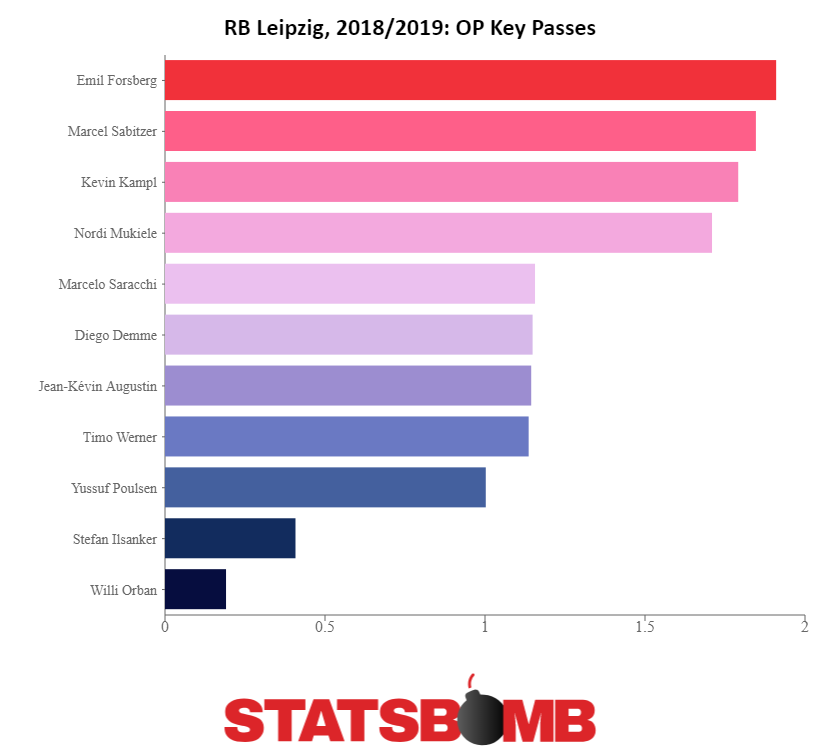 The shots they create tilt toward quantity over quality, especially in the penalty box itself where players are happy to shoot from difficult angles if given half a chance.
The shots they create tilt toward quantity over quality, especially in the penalty box itself where players are happy to shoot from difficult angles if given half a chance. 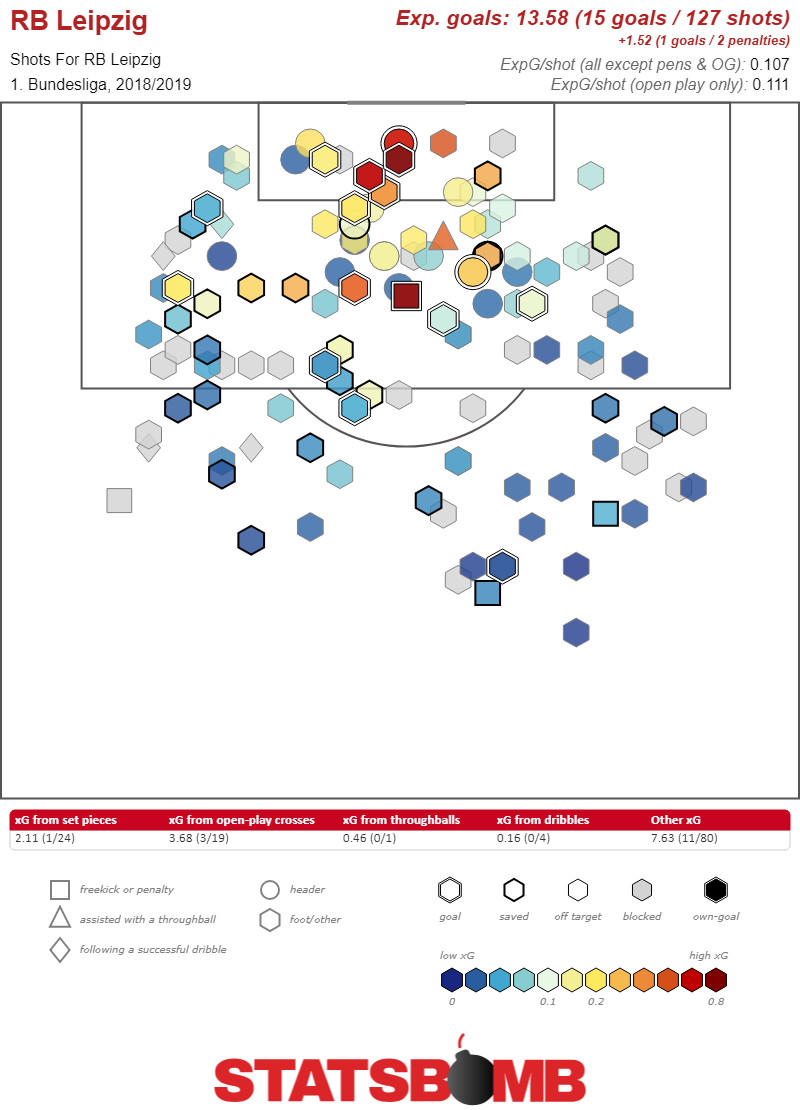 It’s fairly ironic that Leipzig are currently succeeding by playing a somewhat more normal style. Rangnick is one of a small handful of people who can credibly claim to be responsible for ushering in the era of manic defending. It was Rangnick who brought Roger Schmidt to Salzburg in 2012. Schmidt took the high octane counterpressing style that was developing in Germany as Jurgen Klopp turned Dortmund into a juggernaut and turbocharged it at Salzburg. It was an ethos that Rangnick also instituted at Leipzig. Contest the ball as soon as you lose it. Step forward. Win the ball in midfield, play a killer pass or three and then do it all over again. When Leipzig reached the top division the team had immediate success as a defensive juggernaut. They pressed high, they pressed well and they made themselves impenetrable. In a league where everybody pressed, Leipzig stood out. They were one of the top three teams in terms of Passes Per Defensive Action (a metric which measures how many defensive actions a team takes per completed pass they allow in the opposition’s half, one way to measure pressing). That’s not to say that the current iteration of Leipzig doesn’t press. They do. This is a very aggressive defensive heatmap, one that shows a team chasing the ball all over the field. But the team’s numbers have still dropped off notably in this department. Leipzig are only the fifth most aggressive team by PPDA.
It’s fairly ironic that Leipzig are currently succeeding by playing a somewhat more normal style. Rangnick is one of a small handful of people who can credibly claim to be responsible for ushering in the era of manic defending. It was Rangnick who brought Roger Schmidt to Salzburg in 2012. Schmidt took the high octane counterpressing style that was developing in Germany as Jurgen Klopp turned Dortmund into a juggernaut and turbocharged it at Salzburg. It was an ethos that Rangnick also instituted at Leipzig. Contest the ball as soon as you lose it. Step forward. Win the ball in midfield, play a killer pass or three and then do it all over again. When Leipzig reached the top division the team had immediate success as a defensive juggernaut. They pressed high, they pressed well and they made themselves impenetrable. In a league where everybody pressed, Leipzig stood out. They were one of the top three teams in terms of Passes Per Defensive Action (a metric which measures how many defensive actions a team takes per completed pass they allow in the opposition’s half, one way to measure pressing). That’s not to say that the current iteration of Leipzig doesn’t press. They do. This is a very aggressive defensive heatmap, one that shows a team chasing the ball all over the field. But the team’s numbers have still dropped off notably in this department. Leipzig are only the fifth most aggressive team by PPDA. 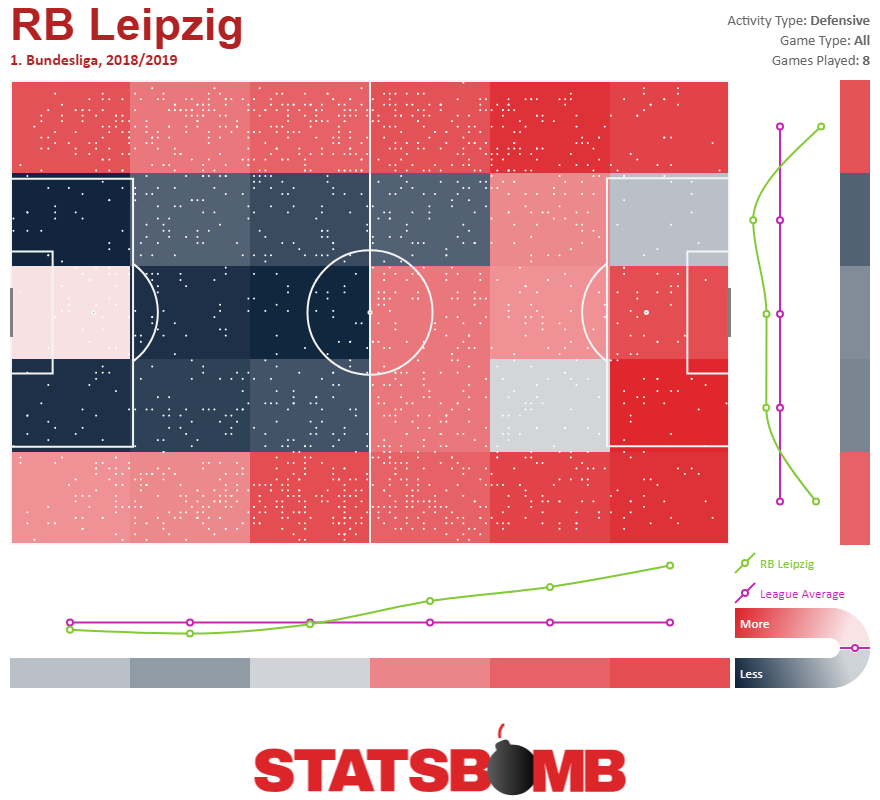 Part of what’s going on here may simply be the effects of a German game which has begun to dramatically slow down over the last couple of seasons. Germany has lost a number of coaches that prioritized playing at breakneck defensive speed. Klopp, Schmidt, Thomas Tuchel and Pep Guardiola all built sides that were designed to defend largely in their opponent’s half and aggressively win the ball back. All of those managers are gone. A number of German teams have achieved success recently playing much more conservatively in defense. Last year’s second place finisher, Schalke played an extremely effective negative style (and despite languishing in 15th place right now have the third best xG against tally in the league and a positive xG differential and will likely improve). This year’s Dortmund team under Lucien Favre play a more conservative style, using possession to create chances rather than using an aggressive defense as the primary creative force. A few years ago the Bundesliga was a counterpressing arms race. Everybody was trying to out press and out scramble everybody else. Eventually there were diminishing returns. It became increasingly difficult to both press more aggressively than the team you were facing and maintain tactical balance so as not to get exploited. Now that trend is reversing itself. A slower Bundesliga means that Rangnick and Marsch have been able to come in, rein in the extreme aggressiveness the team had deployed over its first two seasons, and still manage to be near the top of the league as a pressing defense. The changing Bundesliga suits Leipzig just fine. It’s meant they can decrease their defensive aggressiveness to more stable levels while remaining more aggressive than most of their opponents. In turn, their increased stability has meant attackers can find more shots, and the team as a whole can operate with an effective rhythm of taking the ball, progressing it and shooting it, rather than getting drawn into helter-skelter midfield battles of attrition. Rangnick and Marsch have taken advantage of a changing league and turned a year of transition into one where they are arguably the second or third best team in the league. Not bad for an interim coaching squad.
Part of what’s going on here may simply be the effects of a German game which has begun to dramatically slow down over the last couple of seasons. Germany has lost a number of coaches that prioritized playing at breakneck defensive speed. Klopp, Schmidt, Thomas Tuchel and Pep Guardiola all built sides that were designed to defend largely in their opponent’s half and aggressively win the ball back. All of those managers are gone. A number of German teams have achieved success recently playing much more conservatively in defense. Last year’s second place finisher, Schalke played an extremely effective negative style (and despite languishing in 15th place right now have the third best xG against tally in the league and a positive xG differential and will likely improve). This year’s Dortmund team under Lucien Favre play a more conservative style, using possession to create chances rather than using an aggressive defense as the primary creative force. A few years ago the Bundesliga was a counterpressing arms race. Everybody was trying to out press and out scramble everybody else. Eventually there were diminishing returns. It became increasingly difficult to both press more aggressively than the team you were facing and maintain tactical balance so as not to get exploited. Now that trend is reversing itself. A slower Bundesliga means that Rangnick and Marsch have been able to come in, rein in the extreme aggressiveness the team had deployed over its first two seasons, and still manage to be near the top of the league as a pressing defense. The changing Bundesliga suits Leipzig just fine. It’s meant they can decrease their defensive aggressiveness to more stable levels while remaining more aggressive than most of their opponents. In turn, their increased stability has meant attackers can find more shots, and the team as a whole can operate with an effective rhythm of taking the ball, progressing it and shooting it, rather than getting drawn into helter-skelter midfield battles of attrition. Rangnick and Marsch have taken advantage of a changing league and turned a year of transition into one where they are arguably the second or third best team in the league. Not bad for an interim coaching squad.
2018
RB Leipzig Turn Transition Into Success
By Kevin Lawson
|
November 1, 2018
